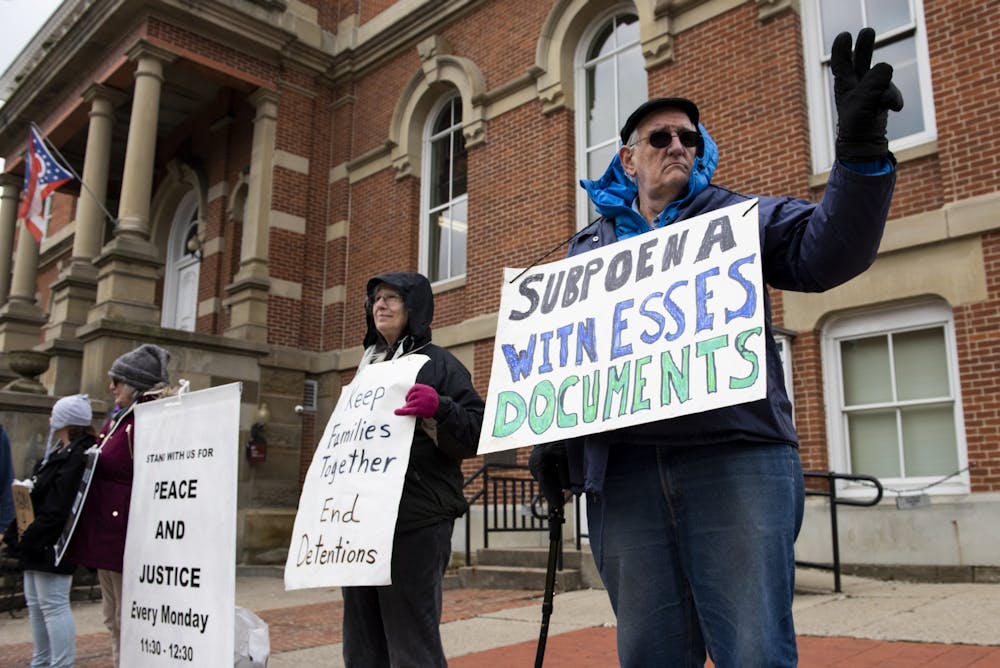On an overcast Monday morning, Peggy Gish stands in the same spot she’s stood in for the past 40 years. Though battling the cold, Gish has an unbeatable determination to bring awareness to something the planet never seems to have: peace.
The Stand for Peace and Justice Vigil takes place every Monday, 11:30 a.m. to 12:30 p.m. at the Athens County Municipal Court, 8 E. Washington St. The vigil has been ongoing since 1979, Gish said. It brings weekly awareness to issues of local, national and worldwide peace and justice issues.
Gish is a lifelong peace activist. The first march she attended was the 1963 March on Washington for Jobs and Freedom, where Martin Luther King Jr. gave his historic “I Have a Dream” speech. For Gish, the 1963 march truly galvanized her sense of urgency for change.
“(After the March), I (felt compelled) to speak out and stand with people who aren’t getting proper treatment,” Gish said.
From there, though only working as a market farmer back in the day, Gish dedicated aspects of her life to peace work. She was part of the original group of local Athens residents who started an informal organization called “People for Peace.”
People for Peace was an activist group whose goal was to raise nuclear disarmament awareness. Since its inception, the informal organization evolved to cover more topics.
“From there, (the vigil) evolved into more peace and justice issues,” Gish said. “Issues like violence against women, the death penalty — the peace and justice issues people should be concerned about.”
Not much has changed in terms of peace and justice over the past 40 years, Gish noted.
Systemic oppression, economic injustice and the lack of urgency for world peace are still relevant issues.
What has changed is how people talk about these issues.
“More people are recognizing the deep roots of oppression in our society,” Gish said.
Gish also remarked that the idea of “intersectionality” is playing a bigger part in mainstream conversations surrounding injustice. Intersectionality is the cumulative way that oppression, violence and injustice affect the experiences of marginalized peoples.
“The problems have not gone away,” Gish said. “(But) more people are willing to be out there (with their beliefs).”
Gish has done international peace work around the world, such as Iraq and Palestine. For Gish, participating in these weekly vigils is one way she works for peace.
“Even if standing (in the vigil) doesn’t dramatically do anything, it allows us to not become apathetic, for us as well as a society,” Gish said.
Through 50 years of peace work, she knows that hard, lifelong work is how change is made. Though Gish does the vigil, she wishes it wasn’t necessary.
“It’ll take more time (to establish peace),” Gish said. “I wish we could stop needing to do this.”
Jan Griesinger, who retired from her work with United Campus Ministry (UCM), attends each weekly vigil. She’s been attending for the past 15 years.
“Both (peace and justice) are important,” Griesinger said. “We don’t have peace or justice and we won’t until the Congress isn’t the best government money can buy.”
Griesinger encourages people to get involved in the vigil, coming and going as they please.
Jo Foley recently began getting involved in the weekly peace vigils. She wanted to become more open about her desire for peace. Though a weekly attendee, she usually doesn’t carry a sign. Instead, she greets passers-by.
“If it’s raining, I'll say, ‘stay dry.’ If it’s cold, I’ll say, ‘stay warm,’ things like that,” Foley said. “I want them to know that they’ve been recognized and that I care about their life at that moment.”
Foley has enjoyed her involvement in the vigils and her fellow company. The people who stand in the protest are one of the reasons why she keeps coming back.
“They’re just a fabulous group of people,” Foley said. “They’re giants, and I like standing in their glow.”
Gish knows the issues will not be solved by only her work, nor work from only her generation. It’s necessary for young people to stay involved in activism for progress to continue.
“We need to pass this on to the younger folks,” she said. “At any age stage in life, people can speak out on important things that we all (should) speak out about. (People) need to work with whatever abilities (they) have. (Everyone) has some role.”






